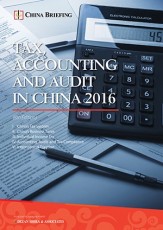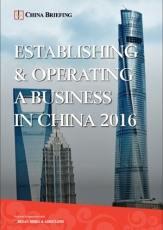China Regulatory Brief: Employee Stock Ownership Reform & VAT Incentives for Hiring Disabled Workers
The SOE Employee Stock Ownership Pilot Reform Program to be Initiated
China’s State-owned Assets Supervision and Administration Commission has recently announced its decision to launch a pilot stock ownership reform program, targeting employees who work in State-owned enterprises (SOEs). The Opinions have been approved by the Leadership Group on SOE Reform of the State Council, and will soon be submitted to the Central Government for permission. According to the State-Owned Assets Supervision & Administration Commission, a handful of enterprises will be selected from the central enterprises and the local SOEs as the first batch of enterprises to be enrolled in the pilot reform program. Efforts will be made to work out an effective model of employee stock ownership from the perspectives of the varying types of enterprises enrolled in the program. Aspects such as mode of capital contribution and share purchase, pricing mechanisms and holding methods will also be explored. Priority will be given to support science and technology enterprises to carry out the pilot program, and central enterprises will not be subject to temporary enactments of the pilot program.
China Further Relaxes Administration on Hong Kong and Macau Businesses
Further relaxation of administration on the registration of individual business household set up by Hong Kong and Macau Residents was brought into effect as of June 1, 2016, according to Gong Shang Ge Zi [2016] No.10 issued by the State Administration for Industry and Commerce (AIC). Applications made by residents of Hong Kong and Macau for setting up individual business households in Mainland China will not be subject to examination and approval of foreign investment (excluding franchise businesses), but will be registered by the relevant department of business directly. According to the Notice, more than 10 previous regulatory documents relating to the registration are no longer valid.
![]() RELATED: Business Advisory Services from Dezan Shira & Associates
RELATED: Business Advisory Services from Dezan Shira & Associates
Mainland China Further Opens up the Service Sector to Hong Kong and Macau
A series of measures to relax the restrictions on investment from Hong Kong and Macau in China’s service sector was introduced June 1, 2016, by the “Decision on Temporarily Adjusting the Special Access Administration Measures for Hong Kong and Macau Service Providers in Mainland China” issued by the Chinese government. These measures will have an impact on a variety of industries, such as telecommunication, marine transport, education, commercial performance, entertainment facilities, exhibitions and civil aviation, etc. The examination and approval of company formation, amendments to contracts and Article of Incorporation for Hong Kong and Macau investors are to be replaced by relevant examination approval regulation stipulated in the measures. Subsequently, the State Council has adjusted and ceased related laws such as the Provisions on the Administration of Foreign Investment in Telecommunication Enterprises, Regulations of the People’s Republic of China on International Marine Transport and Regulations on Administration of Commercial Performance, etc.
SAT Releases Preferential VAT Policies to Promote the Employment of Disabled People
Measures issued by the State Administration of Taxation (SAT) touches upon three areas relating to the employment of the disabled: Materials required for application of preferential VAT policies promoting employment of disabled people for the first time, what to do in case of changes made to filing materials submitted by the taxpayer, and materials to be submitted when a taxpayer applies for a tax rebate. More incentives and preferential tax policies on hiring disabled employees in China can be found here. The “Measures for Administration of Preferential VAT Policies that Promote the Employment of Disabled People,” became effective as of May 1, 2016.
|
Asia Briefing Ltd. is a subsidiary of Dezan Shira & Associates. Dezan Shira is a specialist foreign direct investment practice, providing corporate establishment, business advisory, tax advisory and compliance, accounting, payroll, due diligence and financial review services to multinationals investing in China, Hong Kong, India, Vietnam, Singapore and the rest of ASEAN. For further information, please email china@dezshira.com or visit www.dezshira.com. Stay up to date with the latest business and investment trends in Asia by subscribing to our complimentary update service featuring news, commentary and regulatory insight. |

 Tax, Accounting, and Audit in China 2016
Tax, Accounting, and Audit in China 2016
This edition of Tax, Accounting, and Audit in China, updated for 2016, offers a comprehensive overview of the major taxes that foreign investors are likely to encounter when establishing or operating a business in China, as well as other tax-relevant obligations. This concise, detailed, yet pragmatic guide is ideal for CFOs, compliance officers and heads of accounting who must navigate the complex tax and accounting landscape in China in order to effectively manage and strategically plan their China-based operations.
An Introduction to Doing Business in Hong Kong 2016
Doing Business in Hong Kong 2016 is designed to introduce the fundamentals of investing in Hong Kong. Compiled by the professionals at Dezan Shira & Associates, this comprehensive guide is ideal not only for businesses looking to enter the Hong Kong market, but also for companies that already have a presence here and want to keep up-to-date with the most recent and relevant policy changes.
 Establishing & Operating a Business in China 2016
Establishing & Operating a Business in China 2016
Establishing & Operating a Business in China 2016, produced in collaboration with the experts at Dezan Shira & Associates, explores the establishment procedures and related considerations of the Representative Office (RO), and two types of Limited Liability Companies: the Wholly Foreign-owned Enterprise (WFOE) and the Sino-foreign Joint Venture (JV). The guide also includes issues specific to Hong Kong and Singapore holding companies, and details how foreign investors can close a foreign-invested enterprise smoothly in China.
- Previous Article Auflösung einer Repräsentanz in China – Teil 2
- Next Article China’s New NGO Law and its Impact on FDI into the Higher Education Industry











